Part 1. Has Science Rejected God?
What kind of light did God create on the first day of creation? How should we understand the firmament on the second day of creation? How should we explain to the critics of the Bible why the Lord created plants before the sun? What was the image of God in the creation of man, and what was the likeness? Historian of religion Andrei Ivanovich Solodkov speaks on these matters.
The time difference
Hello, dear readers of Pravoslavie.ru. We are continuing our lecture series on the book of Genesis. At our previous meeting we discussed whether science has rejected God. We noted that many great scientists, such as Isaac Newton, Mikhail Lomonosov, Albert Einstein and others believed in God as the Creator and sustainer of this world. I would like to add a few more words to what was said last time.
The main axiom supporting the idea that “science has proved there is no God,” is that our planet is billions and billions years old, and as a result of evolution humanity and all of nature are moving forward on the path of progress, becoming ever better and more perfect. But is the Earth truly billions of years old?
Creation scientists, chemists, physicists, and doctors of exact sciences with no religious affiliation state that, according to their research and estimations, our earth is at most 30,000 years old; others conjecture that it is only about 20,000 years old; and some tend to believe that our planet is no more than 10,000 years old. And, according to Divine Revelation, passed down to us through Holy Scripture, we are now in the 7524th year from the Creation of the world. By the way, on the antimensions in our churches it is written in what year the antimensions was given to the church, both from the Creation of the world and from Christ’s birth.
So, many scientists assert that the Earth is young. And if it is true, then the whole theory of evolution collapses like a house of cards. But what facts do the scientists who hold that the Earth is 10,000-30,000 years old give?
For example, the following facts. Let us look at the outlines of the continents and islands on the map of the globe attentively. Here are North America, South America, Eurasia, Australia, Japan, Africa… If we unite their contours, then we will see that they make up on whole and fit together rather well. Initially there was a single landmass, but later its pieces drifted in different directions. But the continents move according to some law. And so, if our planet is 4.5 billions of years old (I’m reciting this date from memory—it’s not exact), then we surely would have observed some very serious catastrophes.
There are other proofs. Let’s take the fact that the Moon, our natural satellite, is slowly moving away from the Earth. Scientists have calculated the speed at which the Moon is moving away from our planet and have concluded that the Earth is young; but if it were 4.5 billion years old (as the evolutionists maintain), then we would have lost the globe’s only satellite long ago. And another interesting fact: when NASA was launching the first spacecraft to the Moon, it feared that it would sink into cosmic dust, speculating that our planet was tens of billions of years old. They even made special shields for the spacecraft to prevent it from sinking in the cosmic dust. But when it landed on the Moon, it turned out that the layer of dust there was only three— four centimeters deep. This again indicates that our universe and our planet are young.
The next evidence is magnesium precipitation. The chemical element magnesium is deposited in a certain quantity. If our home is billions of years old, then we should see considerable layers of magnesium precipitation somewhere. But, they do not exist. One more proof is the Law of Precession. According to it, the Earth loses energy and slightly slows down its rotation within a period of seventy years or more. And if the Earth is billions years old, then everything on the planet would either have collapsed like a pancake or flown away because of its rotation. When students ask me what happened to the dinosaurs, I usually tell them: “According to the theory of evolution, they simply spun around for a while and then flew off because they were the heaviest creatures.” It is a joke, but we will discuss it seriously when we read verses from Holy Scripture later.
Thus, as we see, there is no proof that our Earth is billions years old—it’s nothing more than a theory. But various theories abound.
“And God saw that it was good”
Let us turn now to studying the Holy Scriptures. The first book of the Bible is called Genesis, which literally means “Beginning.” A man who knows his origins, knows where he has come from, and who is aware of the purpose and end of life, has a more comprehensive awareness.
So let’s read the first chapter:
In the beginning God created the heaven and the earth. And the earth was without form, and void; and darkness was upon the face of the deep. And the Spirit of God moved upon the face of the waters. And God said, Let there be light: and there was light (Gen. 1:1-3).
So the first verses of the Holy Scriptures tell us that in the beginning God created the heaven and the earth. Here the word “God” is used in the translation. But in the Holy Scriptures God has many names: Adonai, Shaddai, Elohim, El, Sabaoth, Yahweh… Why does God have so many names? The point is that God’s essence cannot be expressed in any one name. And under one or another name God would appear to representatives of the people of Israel, who were the chosen people in a certain historical period, believing in one God while surrounded by pagan peoples: the Moabites, the Amorites and others. And so, God used to appear under one or another name, depending on what kind of revelation the person was supposed to receive. For instance, if God appeared with the name Elohim, it meant the people had forgotten that He is Creator and Benefactor; if with the name Adonai, it meant the people had forgotten that He is Lord, placing their hope in earthly princes, the sons of men, although it was said: Cursed be the man that trusteth in man… (Jer. 17:5); if with the name Sabaoth, it meant that the people had forgotten that God was their Glory, that He was to be glorified, as it was written: For them that honor me I will honor (1 Sam. 2:30).
A great deal is already revealed in the first verses of the Bible. “God created”—but in the original text the word “God” is written in the plural. The first verse verbatim reads: “In the beginning Gods created…” Why is the plural used here? At the very beginning of Holy Writ there is an indication of God the Holy Trinity. We will also find this indication in the twenty-sixth verse of the book of Genesis which relates how God created man; and again we will find it in the eighteenth chapter of Genesis—the Holy Trinity’s appearance to Abraham.
Thus, in the beginning the Lord created the heaven and the earth. Many holy fathers said that “the heaven” means the world of the angels and archangels—God first created the invisible world. “The earth” is that same Earth which still exists.
We read: And the earth was without form, and void; and darkness was upon the face of the deep. And the Spirit of God moved upon the face of the waters. The word “moved” can be translated differently, but it can be understood as “the Spirit hovered over the waters” or “warmed the waters with His own heat.”
Further: And God said, Let there be light: and there was light. What kind of light was it? It’s a very important question. This is what St. Basil the Great wrote on the matter: “So, with a single word and in one instant, the Creator of all things gave the boon of light to the world.” So the light of which Holy Scripture speaks is the gracious gift that the Lord put into this world.
The theologian Vladimir Lossky (1903-1958), who made a sort of distillation for a better understanding of patristic works by those unfamiliar with the Patristic Tradition, wrote the following: “The light… is not so much physical vibrations, that is, the light that we see, as it is ‘the light of reason,’ that is, the origin of order and harmony in the universe.” So, this light is “the light of reason.”
And we read further:
And God saw the light, that it was good: and God divided the light from the darkness. And God called the light Day, and the darkness he called Night. And the evening and the morning were the first day (Gen. 1:4-5).
Many people wonder what this darkness is. All the fathers of the Church say that darkness is absence of light. For example, Venerable John of Damascus wrote: “Darkness is not a substance, but it is absence of light.” Thus an Orthodox Christian, unlike adherents of other religious systems, does not believe in dualism, according to which good and evil both existed from the very beginning. Evil did not initially exist! We will speak of the origin of evil when we analyze the third chapter of Genesis.
And we read further:
And God said, Let there be a firmament in the midst of the waters, and let it divide the waters from the waters. And God made the firmament, and divided the waters which were under the firmament from the waters which were above the firmament: and it was so. And God called the firmament Heaven. And the evening and the morning were the second day (Gen. 1:6-8).
On the second day the Lord created the firmament. Many think that the firmament is the ground. That is wrong. The firmament is that weightlessness where the Lord subsequently formed and fixed the stars, the Earth, the solar system, all other planets and generally the whole universe that human eyes can perceive.
I should note that Orthodox Christians who read the Holy Scriptures have never believed in those false ideas and fantasies according to which the Earth is flat and on the back of a turtle swimming in the sea… These are pagan theories. And we have always known from the book of Genesis, written 1,500 years before the Nativity of Christ, that the world was wondrously and wisely created and arranged by God.
And what can be said of the waters mentioned in the verse: and divided the waters which were under the firmament from the waters which were above the firmament? What are these waters under the firmament and above the firmament? According to the teaching of the Church Fathers, the waters under the firmament are the seas and all the water on the Earth. As for the waters above the firmament, this is a great mystery. The fact is that “the firmament” is a translation of the Hebrew word “raka” which means “emptiness,” “weightlessness.” And the waters above the firmament, according to the fathers, are some cosmic waters which are being preserved for a specific time. This is what St. Ephraim the Syrian wrote on the matter: “These waters abide there as the dew of blessing, preserved for the outpouring of wrath” of God before the end of this world. St. Basil the Great wrote similar things as well: these waters are reserved for a specific moment.
From our school physics lessons we all remember that device which demonstrates how lightning and thunder appear. We know that certain energies collide and cause an electric discharge and so we see lightning. But, as we see, in real life charged thunderclouds do not always produce lightning and thunder upon impact. Black clouds come, you wait for a storm, but there’s no lightning and you don’t hear any thunder. Recently scientists working on space stations and observing Earth’s atmosphere from outer space spotted the following phenomenon (and their computers, their equipment showed it as well): first some rays, invisible for human eyes, strike some clouds, then a discharge occurs, finally a lightning flashes and soon it starts to thunder. But if there is no such radiation, neither lightning nor thunder will appear, and nothing happens. This is another example showing that we still know practically nothing about nature. I heard not too long ago on a radio show that they found a squid 32-50 feet long. Everyone thought that no such thing exists, but it really does. Many scientists now say that only seven per cent of the world’s oceans have been explored to date. Seven per cent! It’s nothing.
But let us read further in Genesis:
And God said, Let the waters under the heaven be gathered together unto one place, and let the dry land appear: and it was so. And God called the dry land Earth; and the gathering together of the waters called he Seas: and God saw that it was good (Gen. 1:9-10).
What kind of water initially covered the whole land? Venerable Ephraim the Syrian wrote that the water which had covered the whole land was not salty but fresh. Fresh water was designed for irrigating all the land. Later, when the Lord separated dry land from water and gathered the water into seas, it became salty in order to prevent rotting, as Venerable Ephraim explained. Thus, at first fresh water was necessary for the fertilization of the land, but then it became different to avoid any decay on Earth.
We read further:
And God said, Let the earth bring forth grass, the herb yielding seed, and the fruit tree yielding fruit after his kind, whose seed is in itself, upon the earth: and it was so. And the earth brought forth grass, and herb yielding seed after his kind, and the tree yielding fruit, whose seed was in itself, after his kind: and God saw that it was good. And the evening and the morning were the third day (Gen. 1:11-13).
On the third day of Creation God brought plants into being. And vegetation was created by God with such wisdom! Let’s take an acorn as an example. Who put so much information into a tiny acorn that it grows into a huge oak, and not into a birch or a pine tree? Who, speaking in modern language, “downloaded” all the necessary information into a sunflower seed, like a kind of flash drive, that it will inevitably grow into a tall sunflower which turns its bloom from west to east? Who inserted such information into a simple grain of wheat that it will eventually become bread? Who did all of this? It’s a very serious question. If we do not load any program onto a computer or a storage medium, they remain pieces of metal or plastic. Therefore, God the Creator and Sustainer of the world, arranged everything in this world in a wonderful way. He creates all the things by His will and providence.
So on the third day God created vegetation. But this vegetation remained lifeless for a short time—one day: there were no birds, no fish, no animals to inhabit all these forests, and there was as yet no man—the crown of creation.
We read further:
And God said, Let there be lights in the firmament of the heaven to divide the day from the night; and let them be for signs, and for seasons, and for days, and years: And let them be for lights in the firmament of the heaven to give light upon the earth: and it was so (Gen. 1:14-15).
And let them be for lights in the firmament of the heaven”—recall that the firmament is weightlessness—we spoke about this already. There’s more we need to say in connection with these verses in the book of Genesis. Many critics of Holy Scripture sneer: “You should have edited the Holy Scriptures!... How is it that first the grass and herbs bearing seed are created, and then the sun? Everything is exactly the opposite! First should be the sun and then plants—they can’t grow without photosynthesis! The days are wrong in the Bible.” No, we answer, Divine Revelation is in need of no such revision. God has all wisdom. God creates vegetation first, so that, as St. Basil the Great writes about it, we wouldn’t become idolaters and start worshiping the sun, and wouldn’t think that the sun is the cause of all life on earth. Therefore God first inserts His light, His Divine Energy, His grace into plants, in every seed they bear, in every bush which grows, in every petal, in every tree, in every flower which will ever grow on earth. God does everything in wisdom and thereby delivers us from idolatry.
And another rebuke: “How can you calculate days without the sun?” Sts. Ephraim the Syrian, Basil the Great and John of Damascus explain it this way: at that time, for the days to change, the light sunk into the primeval waters, and by it they were illumined. Then night fell across the whole earth. And in the morning the light rose out of the primordial waters.
Now about the luminaries, which, as it says, are for lights in the firmament of the heaven to give light upon the earth, Venerable John of Damascus writes: within the luminaries the Creator enclosed the primordial light; the light found itself in the luminaries, for the luminaries are not the light itself, but the receptacles for the light. A very important point: St. Basil the Great points out that then was produced the very nature of light (that light of which it speaks in the very beginning of Genesis, in the first verses of the first chapter), but now is prepared the solar body to serve as a chariot for that first-created translucent and immaterial light. In that way, that light, which God created on the first day of Creation, He then enclosed in the luminaries—in the sun, and in the others, reflecting the light of the sun.
Then we read about what else happened on that day of creation:
And God made two great lights; the greater light to rule the day, and the lesser light to rule the night: he made the stars also. And God set them in the firmament of the heaven to give light upon the earth, And to rule over the day and over the night, and to divide the light from the darkness: and God saw that it was good. And the evening and the morning were the fourth day (Gen. 1:16-19).
And then:
And God said, Let the waters bring forth abundantly the moving creature that hath life, and fowl that may fly above the earth in the open firmament of heaven. And God created great whales, and every living creature that moveth, which the waters brought forth abundantly, after their kind, and every winged fowl after his kind: and God saw that it was good. And God blessed them, saying, Be fruitful, and multiply, and fill the waters in the seas, and let fowl multiply in the earth. And the evening and the morning were the fifth day (Gen. 1:20-23).
The Lord creates fish and birds. And looking carefully at the world around us, knowing that God created the birds and fish in one day, we will perceive this world differently. Wherein here is God’s miracle? Birds and fish have a lot in common. Birds have plumage, and fish have “plumage.” And the penguin? It’s a bird living in water. There are flying fish. There’s a fish that can go a long time out of the water, then plunges and lives for a while in the water.
We read further:
And God said, Let the earth bring forth the living creature after his kind, cattle, and creeping thing, and beast of the earth after his kind: and it was so. And God made the beast of the earth after his kind, and cattle after their kind, and every thing that creepeth upon the earth after his kind: and God saw that it was good (Gen. 1:24-25).
On the sixth day of Creation God created the animals. And then—man.
Let’s read about the creation of man:
And God said, Let us make man in our image, after our likeness: and let them have dominion over the fish of the sea, and over the fowl of the air, and over the cattle, and over all the earth, and over every creeping thing that creepeth upon the earth (Gen. 1:26).
The Lord creates animals and man on one day, but He did so differently! He creates the animals saying: Let the earth bring forth the living creature; He creates man completely differently. Recall that, analyzing the first verses of the first chapter of the book of Genesis, where it speaks about God creating in the beginning the heaven and the earth, I drew your attention to the fact that there is a direct reference to the Holy Trinity: the name of God—Elohim—used in the plural, and if these words are translated literally it would be: “In the beginning Gods created.” This is clearly reflected in verse 26: God said not “I make,” but “we make.” The entire Trinity participates in the creation of man: Let us make man in our image, after our likeness.
What was the image and what was the likeness in man? The image, as many Church Fathers interpret, is that gift which God gave us: our immortal soul. There was a time when man was not, but now there will be no time when man is not. God always was, and, according to St. Gregory the Theologian, we cannot say that God was at some point, or He will be—God just is. But there was a time when man was not. However, a time when man will not be, will not be, because God gave man an immortal soul in this image. And what is the likeness? God gave man a free soul—not just immortal, but free too. The likeness consists in that man would be able to progress in God by his free will and attain to God as far as is possible for a creature. As St. Macarius the Great writes, to reach God and become a god—with a little “g,” always remember that God is the Creator, and I am a creature. Always remember that He is the potter and man is the pot.
The Lord creates this world. He creates everything according to His Divine wisdom and His Divine plan. He creates the waters, the firmament, the earth, the vast universe; He creates the fish, birds, stars, animals, and finally, man. And when we survey this whole picture of the universe, we see how far everything is harmoniously, wondrously, and providentially put in this world by God. But willingly or unwillingly we ask the question: if this is really so, then where is the evil in this world from? Why do some people live poorly, and others richly? Why are some people born into families of well-known names, and others no one ever knows. Why do some people delight in power in this world, and others have to count their pennies and live on a few farthings? Why are some people born healthy, and others sick? If God is the Creator and Sustainer of the world, then He is responsible for this world, isn’t He? This question: why God allows evil in this world—is very important. On this theme we will speak in our next meeting.

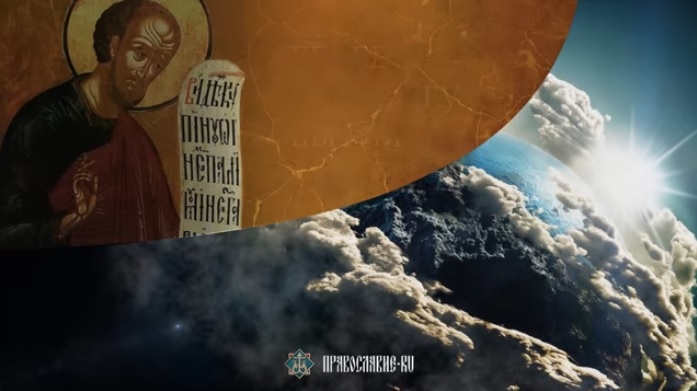




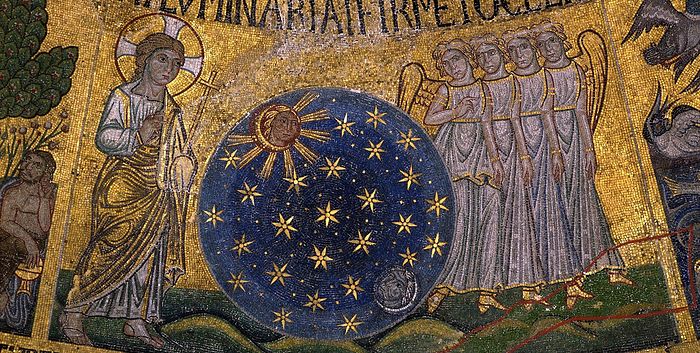
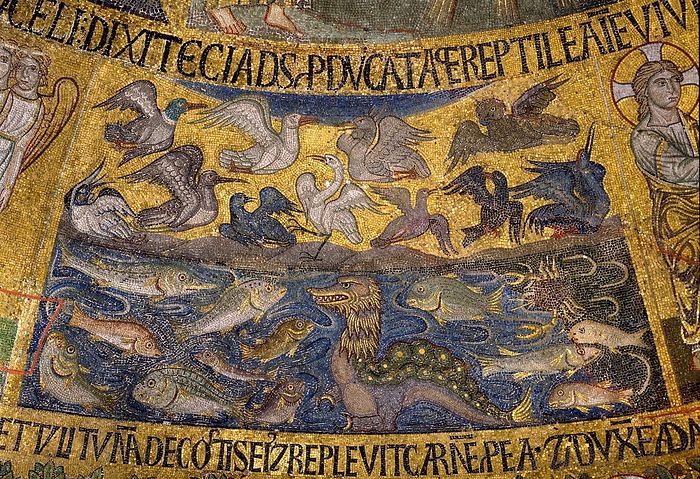

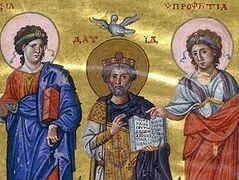
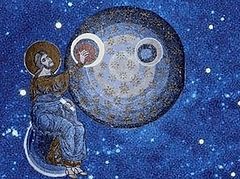

Now we have actual DATA, not only estimations, please read
===============================
This is a flat lie!
Every Holy Fathers of the Church did believe and teach that the Earth is flat, like every man did until at least the scam called 'science' began to concoct every way imaginable to hide God from His creatures in the XV century.
The god in whom Newton, Einstein and their kind believed is not the Only True God, the Living Triune God of Christianity!
May the Lord help you in your delusion that you can believe a little in Christ and a little in antichrists.
https://houseofmaedhros.wordpress.com/2016/08/05/e-pur-non-si-muove-2/